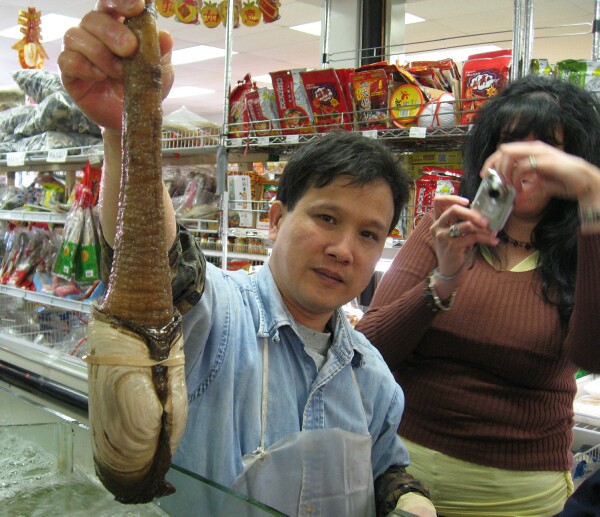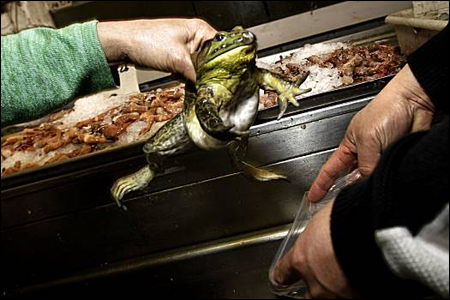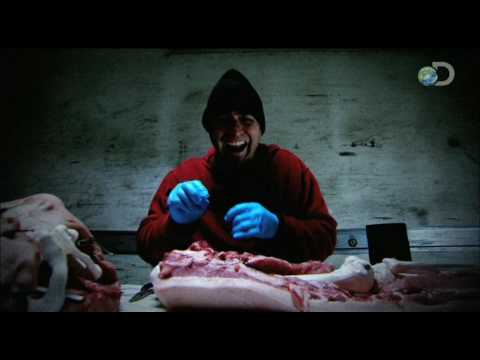The New York Times reports that in the rear of the Great Wall supermarket in Falls Church, Virginia, customers linger over razor clams, frozen conch and baby smelt arrayed at the fish counter. Crabs clamber over the ice. Below, sea bass circle in glass tanks. A girl in a stroller, eye level with a school of tilapia, giggles in delight.
But other tanks are empty. The bullfrogs, turtles and eels that Northern Virginia’s booming Asian population used to buy at the counter and take home to cook are nowhere to be found, seized last  year by state agents who leveled criminal charges against two managers of the store accusing them of illegally selling wildlife.
year by state agents who leveled criminal charges against two managers of the store accusing them of illegally selling wildlife.
The case, which is scheduled to go to trial in June, has put culinary traditions of Asian immigrants into conflict with state laws, illustrating what some see as a cultural fault line in the changing population of Northern Virginia. Asians make up 13.6 percent of the population of four Northern Virginia counties.
Lawyers for the store managers say that the law governing sales of live fish and other animals has not been updated to reflect advances in aquaculture, and that it is tilted against immigrants with unfamiliar cuisines and customs. In a court filing, they argue that the case “seems to be about the tyranny of the majority.”
It is clear that Kai Wei Jin, one of the managers charged, is unhappy about being in the middle of a criminal case. Mr. Jin, 25, fiddled uncomfortably with his phone during an interview, saying he just wanted to satisfy his customers.
“We’re not trying to break the law,” he said. “We just want to do business, and just support the culture.”
Lee Walker, a spokesman for the Virginia Department of Game and Inland Fisheries, said that the laws were necessary to protect wildlife, and that charges were leveled only after a warning went unheeded.
“We really try to educate folks about the regulations before we ever try to bring charges,” he said. “In this case, every attempt was made to educate about what’s legal. And, unfortunately, action was not taken.”
The case arose early last year after what prosecutors called a “concerned citizen” made a report of illegal sales. Officials went to the store several times and bought red-eared slider turtles and largemouth bass, which they said was labeled “mainland rockfish.” They returned last April, seizing turtles, eels, bullfrogs and crayfish, and delivered a warning, prosecutors said.
When officials returned and found largemouth bass still for sale, they said, they sought charges against the managers. Both were indicted on four felony counts, but the prosecutor later agreed to reduce the charges to misdemeanors, which carry potential penalties of jail time and fines of up to $2,500.
Some of the species fall under a broad category of wildlife that cannot be bought or sold, while sales of largemouth bass are forbidden because it is a native game fish. Crayfish can be sold, but the store  lacked permits, according to prosecutors’ court filings.
lacked permits, according to prosecutors’ court filings.
Lawyers for the store managers say that categorizing the fish and other creatures as wildlife does not make sense, because they were farm-raised for eating.
Receipts filed with court motions show, for example, that some of the turtles were raised in Oklahoma. The bullfrogs were shipped from the Dominican Republic. The bass and some eels came from a Pennsylvania fish farm.
A Great Wall store in neighboring Maryland makes for a study in contrast. The fish counter there has many of the creatures that have vanished from the Virginia store. Turtles labeled “farm-raised” paddle in one tank, selling for $9.99 per pound. At the counter, mesh bags bulge with live bullfrogs for $5.99 a pound.




 bin in Berryville, Va., and then tried to resell them, according to court documents.
bin in Berryville, Va., and then tried to resell them, according to court documents. year by state agents who leveled criminal charges against two managers of the store accusing them of illegally selling wildlife.
year by state agents who leveled criminal charges against two managers of the store accusing them of illegally selling wildlife. lacked permits, according to prosecutors’ court filings.
lacked permits, according to prosecutors’ court filings. hemorrhaging, and the doctors were very concerned."
hemorrhaging, and the doctors were very concerned." Robert Holloway alleges that the retailer and its employees "negligently allowed animals to enter the premises and deposit feces in such a manner as to create a dangerous and hazardous condition" and that it should’ve been cleaned up. His suit claims that he slipped during the incident last year, injuring his back and knocking out four teeth. He was 69 at the time, according to the Virginian-Pilot.
Robert Holloway alleges that the retailer and its employees "negligently allowed animals to enter the premises and deposit feces in such a manner as to create a dangerous and hazardous condition" and that it should’ve been cleaned up. His suit claims that he slipped during the incident last year, injuring his back and knocking out four teeth. He was 69 at the time, according to the Virginian-Pilot.